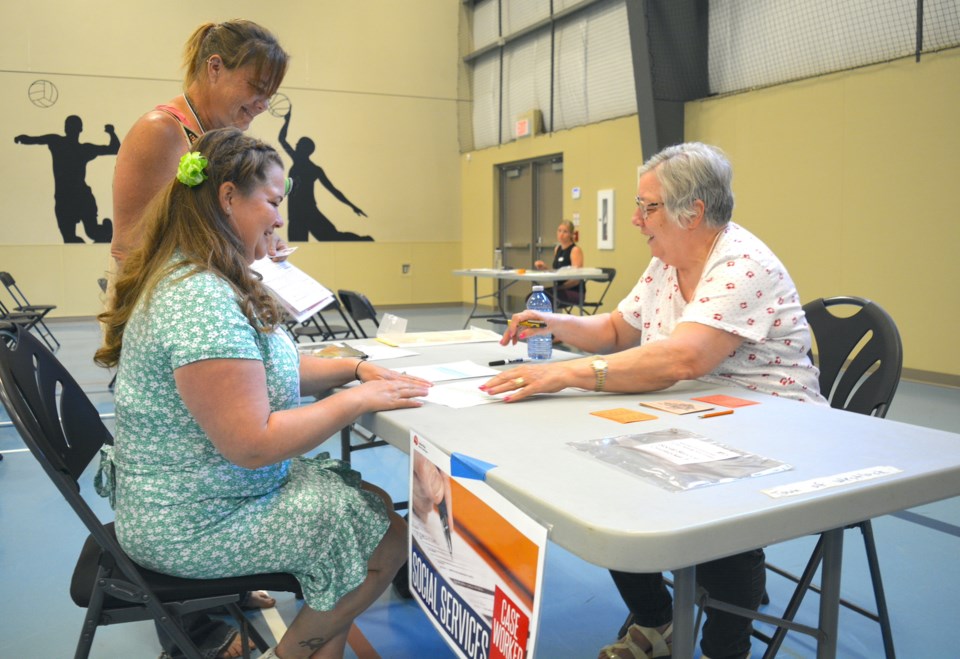WESTLOCK — Experiencing poverty can help residents, agencies, politicians and others understand some of the challenges many families and individuals living in poverty face every single day.
That was the goal behind the Westlock and District Family and Community Support Services (FCSS) poverty simulation, presented by the Alberta Capital Region United Way (ACRUW) at the Rotary Spirit Centre (RSC) June 8, that welcomed about 50 participants, including representatives from the Town of Westlock, Westlock County and Village of Clyde, as well as local agencies and organizations region wide.
“The intent is to have participants experience a simulation of what it would be like living in poverty for one month, so they have to navigate a variety of different services to try and survive and get their needs met,” said FCSS program coordinator Emma Langevin. “Participants are assigned an identity and put into a family and then they have to experience what it’s like to try and survive.”
The simulation was set up in the RSC fieldhouse and incorporated several stations and featured agencies, services and resources that families often access when struggling in poverty such as social services, an inter-faith organization, a bank, school, the utility company, child care centre, pawn shop, pay-day loan store, hospital, jail and homeless shelter.
Participants were grouped into families of various sizes, ages and types which included couples, ‘nuclear families’ and extended families, who role played different situations while experiencing poverty.
One of the participants in the poverty simulation was Westlock mayor Ralph Leriger who said his simulated family situation “was very chaotic which is to be expected,” and noted the struggles they experienced throughout.
“My family situation started poorly and ended worse. The struggles were just too great to overcome,” said Leriger, noting his situation involved a single mother with a 17-year- old son with a pregnant girlfriend and a 14-year-old girl not interested in school and not doing well, with about $10 to the family’s name.
“For an organization like the town it makes it very clear how important it is to make things easy and clear for people to access — take the bureaucracy and red tape out of things because those people are struggling,” he said, adding the event provided an opportunity to see things from a different lens. “I think if we make people more aware of (people’s) struggle, that there is help for them.”
Kristine Jean, TownandCountryToday.com
Program lead engagement facilitator with the ACRUW Ben Ripley, said about one in eight people in the Edmonton region struggles with poverty. He works with agencies and organizations and talks about the many challenges individuals and families face and what communities can do to help.
“This poverty simulation is the most powerful experience that we have that helps people really understand what it’s like,” said Ripley, pointing out there are limitations to it. “It is not what it’s actually, truly like to live in poverty but it is the closest thing that we can provide to be able to teach people a little bit about what it’s like, raise awareness, empathy and help them get motivated to get involved.”
The three-hour event was broken into time segments that included an introduction and overview of the experience as well as time for families to interact with different agencies, services and resources in the community. Each family’s situation in the simulation had different experiences and different outcomes.
“It’s designed to be a stressful experience to try and really give people a simulation of what it would be like living in poverty,” said Langevin, noting the United Way aims to increase understanding and empathy towards people living in poverty, through these poverty simulations. “To understand the stressors they experience, the barriers they experience and the day to day challenges,” said Langivine.
Following the simulation, participants went through a debrief and Langevin noted the participation from local agencies, government and town staff showed, “that we’re all interested in understanding what it’s like to live this way.”
“The policies that we create and the programs that we offer, we want those to be sensitive and receptive to the needs of our most vulnerable,” she said.
Feedback will be collected and put together with results from the recent housing and security survey that ran Feb. 13 to March 31, with information compiled and put towards establishing a community action plan for the community.
“We just wrapped up our housing and security survey that we did in partnership with the Rural Development Network and once we have our final report from that, we’re aiming to create a community action plan against housing and security,” said Langevin. “So we thought what better time to have some of our local decision makers and our agency leaders and staff going through the simulation, as we’re trying to (decide) how we’re going to address poverty and housing insecurity in our community.”



